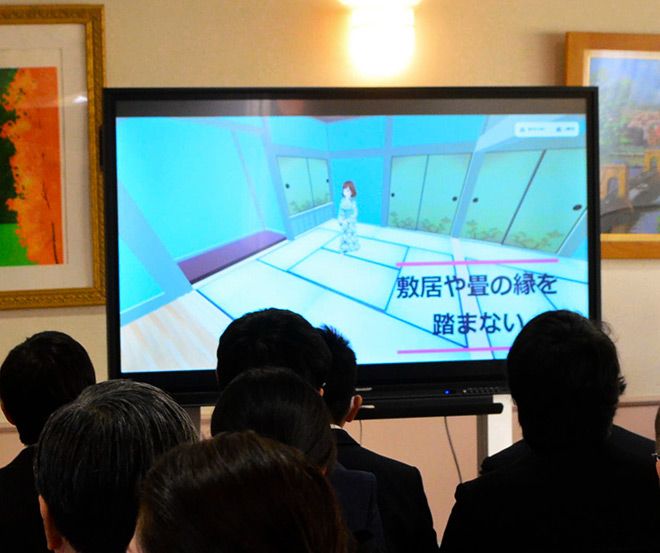GIFU–Students here are replicating one of Japan’s top hot spring resorts in virtual reality to help foreign visitors learn onsen etiquette online before experiencing the real thing.
The three-year initiative was created by students from Gifu Women’s University’s “metaverse club” at the request of a group of ryokan managers in the prefecture.
They hope to raise awareness of spa culture among international tourists.
Using artificial intelligence and motion capture technology to reproduce natural movements in virtual reality, the students are bringing innovative technology to their local communities.
In July 2022, Gifu Women’s University signed a cooperative agreement with the prefecture’s Gero city to virtually duplicate the Gero Onsen resort–one of the three most renowned hot spring areas nationwide.
The project will allow virtual visitors to explore metaverse replicas of the resort’s actual inns and facilities inside and out. Information about tourist spots and souvenirs will appear alongside the digital replicas.
The developers hope to lure in more sightseers by allowing tourists’ digital avatars to visit the onsen town in the metaverse before their trips.
VIRTUAL RYOKAN
The metaverse club’s objective is to propose, develop and improve creative solutions to society’s problems using virtual reality.
The club has already completed an app that shows users how to behave at ryokan.
In the app, a guide character explains the proper manners to use in traditional rooms, communal baths and at Japanese banquets.
The guide moves around metaverse replicas of each location while giving tips.
For example, the instructor says one “should not step on the doorway’s threshold or tatami mats’ edges.”
Users are also advised to “enter a large common bathroom with only a towel in hand.”
Another lesson is about how to use chopsticks: “Hold the upper stick like a pencil and fix the lower one between middle and ring fingers.”
Motion capture technology was used to create the character’s movements. Sensors were put on a student’s head, hands, legs and other body parts to scan realistic motions.
An AI voices the virtual instructor in five languages, including Chinese, English and Thai.
The etiquette simulator is accessible from hotels and ryokan in Gifu Prefecture.
The service was developed after Gifu Manmaru Okami no Kai, a group of hospitality managers, asked the students last August to create an app to “explain manners in onsen resorts in an easy-to-understand way.”
The request was prompted by an influx of overseas visitors and young Japanese travelers after the COVID-19 travel restrictions were lifted.
“Manners at ryokan are hard to figure out from text explanations alone,” said Keiko Taki, chairwoman of Gifu Manmaru Okami no Kai. “We will be making full use of the app as part of our hospitality to help guests enjoy their trips.”
TOOL FOR EDUCATION
The club members are also developing a virtual factory tour.
Gifu Auto Body Co. in Kakamigahara, Gifu Prefecture, which offers tours for elementary school children and others, wanted educational materials to help kids prepare and review for social studies classes.
The goal is to allow participants to see the manufacturing process anytime, since some machines are not in use during tours.
The exterior of an automobile plant has been completed in virtual reality. Various manufacturing steps from welding to assembly and inspections will be reproduced in the new fiscal year that starts on April 1.
“The actual factory is too large to readily understand its entire structure,” noted Nodoka Kojima, a senior at the university’s cultural development faculty, who had been the head of the metaverse club. “Our hope is that touring a plant in virtual reality before going to its brick-and-mortar counterpart will deepen participants’ understanding.”
This news is republished from another source. You can check the original article here

